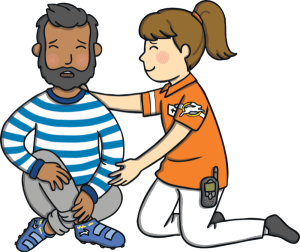What is Personal injury for security officers?
Personal injury for security officers refers to any physical harm or injury that a security officer sustains while performing their job duties. Security officers are employed to protect people, property, and assets, and their job often involves dealing with potentially dangerous situations.
Some examples of personal injuries that security officers may experience include physical assaults, injuries from falls, strains or sprains from physical exertion, exposure to harmful chemicals or substances, and injuries sustained while restraining or detaining a suspect.
If a security officer suffers a personal injury while performing their job duties, they may be entitled to workers’ compensation benefits, which can include medical expenses, lost wages, and disability benefits. It is important for security officers to report any workplace injuries to their employer as soon as possible and to seek medical attention if necessary.

What are First aid aims for security officers?
The first aid aims for security officers are to provide immediate medical assistance to an injured or ill person until professional medical help arrives. As a security officer, it is essential to have basic first aid knowledge and skills to be able to provide the necessary assistance in case of an emergency. The following are the first aid aims for security officers:
- Preserve life: The primary goal of first aid is to preserve life. The security officer must assess the situation and ensure that the injured person is breathing and has a heartbeat. If the person is not breathing or does not have a heartbeat, the security officer should start CPR (cardiopulmonary resuscitation) immediately.
- Prevent the condition from worsening: The security officer must take immediate action to prevent the condition of the injured person from worsening. This may include immobilizing broken bones or stabilizing the neck and head of a person with a suspected spinal injury.
- Promote recovery: The security officer should provide comfort and reassurance to the injured person and take steps to promote their recovery. This may involve keeping them warm, administering pain relief medication, or monitoring vital signs such as blood pressure and pulse rate.
- Ensure professional medical help: The security officer must call for professional medical help as soon as possible, especially if the injury or illness is severe. They should provide accurate information about the injured person’s condition, location, and any other relevant details.
In summary, the first aid aims for security officers are to preserve life, prevent the condition from worsening, promote recovery, and ensure professional medical help.